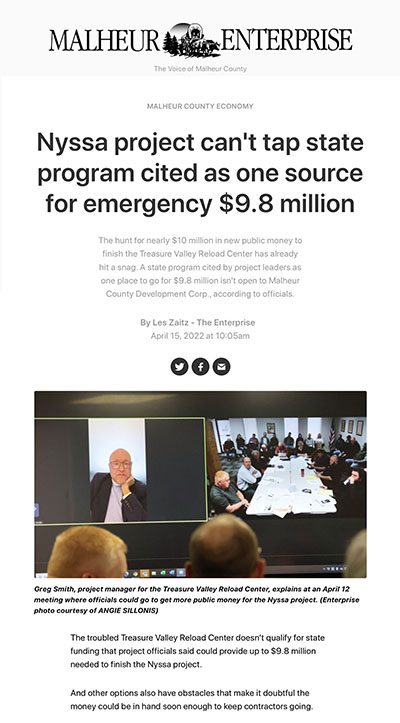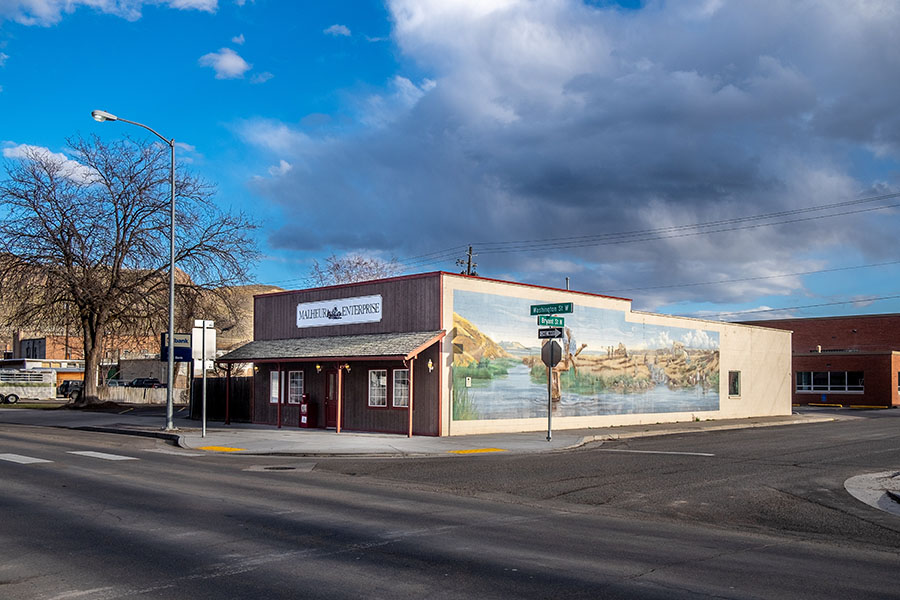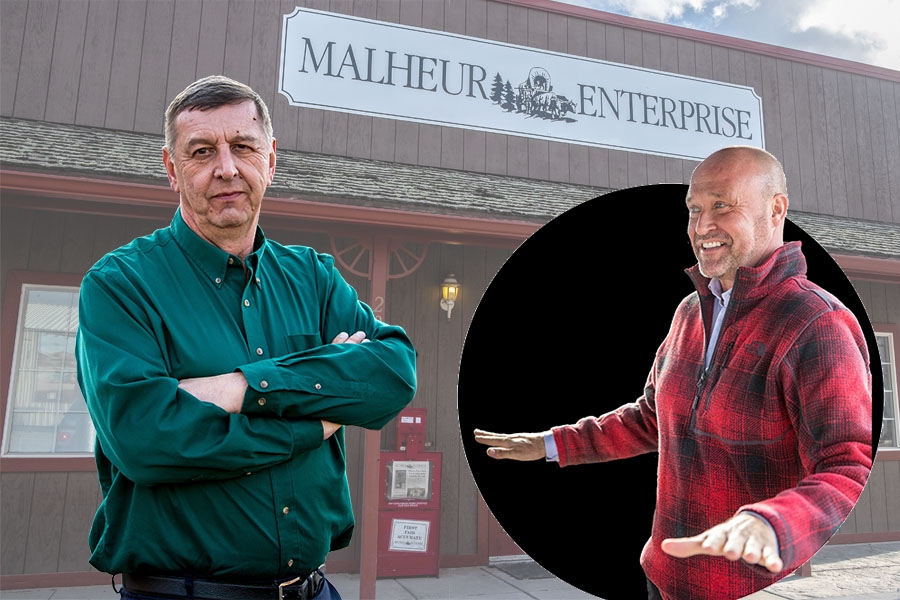The Malheur Enterprise kept a critical eye on a local legislator’s business dealings for years. Then the paper went up for sale, and Greg Smith came calling.
The Offer
On March 8, Les Zaitz checked his email.
The editor and publisher of the Malheur Enterprise had asked Greg Smith, a state legislator who also oversees multiple economic-development agencies in Eastern Oregon, to comment on an upcoming editorial. He had, a few days prior, published an investigation into Smith’s work in the latter capacity.
 Screenshot of a Malheur Enterprise story from April 15, 2022
Screenshot of a Malheur Enterprise story from April 15, 2022
It wasn’t the first. A June 2019 story detailing the contracts Smith manages throughout the state won two Greater Oregon Society of Professional Journalists Awards, including a first-place finish in political reporting.
And in August of the same year, the newspaper reported that a Boise, Idaho-based car wash company opened a location in Malheur County after Smith’s office promised a five-year tax break.
That tax break, reporter Pat Caldwell wrote, failed to materialize. [Disclosure: I worked at the Argus Observer from 2003 to 2005, and Caldwell was my boss.]
After the story published, Smith asked Malheur County sheriff Brian Wolfe to investigate the paper and its staff for placing multiple calls and emails asking Smith and his staff for comment.
Wolfe declined.
In March, Smith — who did not respond to multiple interview requests from Oregon Business — took a different approach.
“Please know, locals are begging for you to sell this community newspaper,” he wrote to Zaitz. “No advertisements equals no support…how is your local advertising?”
Smith closed with a postscript: “If you need a buyer for the paper, I’ll pay $35,000 cash. No employees included.”
“I suspect he is more frustrated than serious,” Zaitz wrote in an email to OB.
It’s true that the paper was up for sale.
In February Zaitz had announced its sale, but no asking price was listed. Instead, a post on the website for the Institute for Rural Journalism and Community Issues asked for “a confidential essay on your background, your ambitions and what you learn independently about the Enterprise that makes you interested.”
By the time Smith’s offer rolled in, the deadline in the listing — March 1 — had passed.
But Zaitz tells OB he’s not actually in a rush to sell.
The listing asks interested parties to describe, “in general terms, your financial strength” and offers financing and a manageable entry cost.
 Home of the Malheur Enterprise. Photo by Jason E. Kaplan
Home of the Malheur Enterprise. Photo by Jason E. Kaplan
“I’m not going to just hand the keys to someone and all they’re going to see is my taillights,” Zaitz told The Poynter Institute, a journalism research and advocacy organization, shortly after the announcement went live. “We’ll be there as a support system to give them every opportunity to build on what we’ve done and to be a success.”
Zaitz is a storied figure in Oregon journalism. A two-time Pulitzer Prize finalist, Zaitz has spent most of his nearly 50-year career as an investigative journalist at The Oregonian, and his entrepreneurial turn has earned him regional and national attention as a glimmer of hope in a struggling news climate.
Now, he says, he wants to give retirement a real shot. But it’s clearly going to take more than a $35,000 check to get him to ride into the sunset.
The Scout
The Enterprise’s June 2019 story on Greg Smith — the one that prompted Smith to call the sheriff —opens with the line, “Greg Smith is a juggler.”
It’s a fair description. It may also be the only succinct one.
Smith directs Eastern Oregon University’s Small Business Development Center in La Grande. He’s also the Columbia Development Authority’s executive director, overseeing the transformation of the decommissioned Umatilla Army Ordnance Depot. He also oversees economic-development agencies in Harney, Malheur and Baker counties.
And he’s represented District 57 — which includes Umatilla, Morrow, Gilliam, Sherman and Wasco counties — in the Oregon House of Representatives since 2001, making him the longest-serving member of the House. (Smith, a Republican, is up for reelection this fall and is unopposed.)
As a legislator, Smith makes just under $33,000. That puts him on par with many of his constituents: The per-capita income in Morrow County, for example, is $24,655, and the median household income is $56,572. Serving in the Legislature is a part-time job, and at the end of this session, three state legislators said they would not seek reelection, saying the low pay meant they were unable to balance their legislative duties with their day jobs and family responsibilities.
Smith, by contrast, has made it work.
All the aforementioned economic-development work is funded by Oregon taxpayers, through contracts awarded to his company, Gregory V. Smith LLC.
EOU’s contract with Smith pays $118,000 a year, the Enterprise reported in 2019. The Columbia Development Authority contract pays $107,000 a year.
Moreover, in 2017 Smith “arranged legislation to set aside $7 million in state money for roadwork needed by his employer” for the Umatilla Depot as part of a larger transportation package, the Enterprise has reported. In testimony before the committee vote on the bill, Smith disclosed that he had “clients that have projects funded through this bill.”
A May 2019 Willamette Week story on Smith notes that under Oregon law, if a lawmaker stands to benefit from legislation financially, he must disclose the conflict — but does not need to recuse himself from the vote.
Smith told the newspaper he discloses conflicts so often he “get[s] teased by everyone.”
“It looks corrupt,” a public-interest lawyer named Dan Meek told WW, “but in Oregon, corruption is legal.”
The Measuring Stick
The March 2022 Enterprise story that prompted Smith’s offer to buy the paper opens by describing an audit Smith said was conducted of the Malheur County Development Corporation (MCDC), which his company receives $108,000 a year to run.
Smith told the newspaper his agency had been audited by an outside entity, but he could not say who had conducted the audit or provide any evidence it had taken place — not so much as a calendar entry.
Smith’s account of the audit, the paper concluded, “was fiction.”
Other economic-development agencies, the Enterprise noted, compile annual reports chronicling their progress: how many jobs saved or created and how many businesses received support.
MCDC has not published such a report. Malheur County officials admitted to the newspaper that they could think of just a handful of businesses that had received help of any kind from Smith’s office. One was a coffee shop called Somewhere Out West Coffee, situated on the Nevada-Oregon border and owned by a Nevada resident.
And the county commissioners acknowledged that they needed to keep tighter oversight of Smith’s office.
It raised the question: What could and should Smith be doing for Malheur County — and the other rural counties he serves?
One way to answer that question is to get a handle on what economic development is, and what economic-development agencies typically do.
Aniko Drlik-Muehleck, a project coordinator with the University of Oregon’s Institute for Policy Research and Engagement, oversaw a project to map Oregon’s economic-development ecosystem. Her team has identified more than 800 organizations throughout the state, including government agencies, nonprofit development organizations and trade groups like chambers of commerce. And they may engage in a range of activities, from marketing and attraction to business recruitment to real estate development to business incubation.
Even the 11 federally designated economic-development districts can be quite different from each other in how they approach the work.
“Because there is not a very prescriptive formula for what a district should be, each district ends up kind of forging their own way,” Drlik-Muehleck tells OB. “Some of them are housed at councils of government, some of them are kind of like a nonprofit agency that are quasi-governmental, but less so maybe than a council of government.”
And organizations with the same mission can approach the same work very differently.
Randy Cox, the director of Klamath County Economic Development Association, says his agency focuses on recruitment and attraction, retention and expansion, and scalable entrepreneurship.
But it was Cox’s approach to relationship building that tipped the scale and made Scott Siracusa, general manager at Wilsonart, open a facility in Klamath Falls. Siracusa’s division, KML, makes wood-laminate panels and was drawn to Oregon in part because of the access to timber. But Nevada was a top choice as well — and the latter offered more attractive tax breaks.
“That’s where Randy and KCEDA really shine,” Siracusa tells OB. “It was, ‘Let me introduce you to the city manager, let me introduce you to these two county commissioners, let me introduce you to three builders in the area that will be capable of [building your facility].’ A lot of people don’t realize that when you’re starting to investigate an area, you don’t know anybody and you’re rolling the dice.”
Siracusa says his facility employs about 40 people, with plans to expand. He declined to say how much they are paid but said wages are above average for the area.
While MCDC has not provided much in the way of official documentation of its work — not so much as a work plan or audit — the agency has touted some success stories on its website.
A March 17 press release says MCDC helped facilitate funding to help the owners of an Ontario golf course upgrade its aging irrigation system.
The release contains few specifics. But Scott McKinney, the owner of Country View Golf Course, was happy to elaborate in a phone interview with OB.
McKinney says he and his family bought the land the golf course sits on in 1997 and opened the golf course in 1999. He had been looking to upgrade the golf course’s irrigation system for some time but struggled to secure financing through traditional banks. Then he saw an advertisement for MCDC and decided to reach out.
“We went down that road, and a couple months later I had my loan. It was kind of a miracle,” he says. McKinney adds that money from the loan — about $205,000, part of which was a refinance on an existing loan — had deposited in his bank account just days before he spoke with OB in mid-April. He says he has run the business “like a family farm,” with no outside staff and a volunteer who provides lawn care in trade for golf. He’s hopeful he’ll be able to hire staff in the near future.
McKinney says he’s aware Smith and his office have received some bad press.
“I can only personally tell you what I experienced with it. It was a good experience,” McKinney says.
“Sometimes Eastern Oregon is forgotten,” McKinney adds. “Sometimes people think Eastern Oregon is Bend. But there’s a lot more over here, and we’re a whole different scenario than it is on the Salem side of the state. Sometimes we struggle with economics. It’s just good to have them looking out for us.”
News Deserts
Zaitz declined to say how much he paid for the Enterprise when OB asked him in 2018. And when asked again in March whether Smith’s offer compared to what he had paid previously, he again demurred.
But just as Zaitz’s recent announcement got some attention from business and media reporters outside the Enterprise’s coverage area, so did the 2015 sales listing by former owner Rick Nelson. The listing is no longer online, but an August 2015 Adweek article says Nelson initially listed the asking price as $90,000 and later dropped it to $26,000. A few days after the Adweek article, Oregon Public Broadcasting reported, Nelson’s offer had gotten a tad more specific, saying the paper could be had for “a fully restored old pickup” and three dental implants.
He told OPB he was “three-quarters joking” but wanted the paper to go to the “best journalist possible.”
Two months later, Zaitz — in partnership with his wife, Scotta Callister, and his brother, Lyndon — bought the paper.
Zaitz was a well-known figure in Northwest journalism before he started running his own media outlets. He’s won the Bruce Baer Award, Oregon’s top honor for investigative journalists, five times, and was named a Fellow of the Society by the Society of Professional Journalists in 2020. He was even featured in the 2018 Netflix docuseries Wild Wild Country, which recounts the period in early-1980s Oregon when Bhagwan Shree Rajneesh decided to relocate his ashram to Central Oregon. (Zaitz covered the Rajneesh story — which includes the single largest bioterror attack in U.S. history — as a young reporter, even traveling to India to investigate Rajneesh’s background and financial dealings.)
Since purchasing the Enterprise in 2015, Zaitz — with help from real estate developer Larry Tokarski — has since founded two Salem-based news sites, the Salem Reporter and the Oregon Capital Chronicle. Zaitz and his wife also own a ranch near John Day, and Zaitz owns Mazama Media, a content-management system.
In a time when local news outlets are shuttering or cutting back, the success of the Enterprise has been hailed as a refreshingly hopeful counterpoint: Zaitz has told reporters the paper is thriving.
While Smith’s offer is within the ballpark of Nelson’s asking price for the Enterprise in 2015 — sans dental implants, anyhow — it’s hard to say what a small newspaper is worth in 2022, says Seth Lewis, director of journalism at the University of Oregon. Whether the paper carries debt, for example, or prints on its own printing press can greatly alter the value.
Lewis also says that while the prevailing narrative is that newspapers everywhere are failing, the truth is a little more complicated.
“We get this idea in our heads that all newspapers are failing and they’re failing in the same way. They’re all being challenged by this digital transformation but they aren’t all being challenged in the same way,” Lewis says. Many newspapers have narrower profit margins than they’ve had in the past — but remain profitable, he says.
As for what Smith planned to do with the Enterprise had his bid succeeded, it’s hard to say.
Smith did not respond to requests for his interview in the form of emails and messages left with staff at MCDC but did speak to the Nieman Journalism Lab, which ran a story about Smith’s offer in March.
In that interview, he walked back part of what he’d written in his email to Zaitz and said instead he would probably hire back at least some of the Enterprise’s staff.
But, he adds, the community is “looking for stories about what’s going on with the Future Farmers of America. What’s going on in the gymnasium? What’s going on at the local city hall? You have this gentleman who’s extraordinarily recognized, but he’s running a small-town newspaper like it’s The Wall Street Journal. And folks don’t appreciate it.”
As this issue went into production, the Enterprise’s front-page stories included the news that the Treasure Valley Reload Center — a project for which Smith secured $26 million in state funding in 2017 — was $10 million over budget.
It also includes recent stories about the Nyssa marching band’s taco feed, a list of upcoming Easter-egg hunts and a feature, penned by Zaitz, about two local students recounting their trip to the FFA’s state convention in Redmond.
Following Smith’s offer, the Enterprise asked followers of its Facebook page whether owners should accept the offer. Commenters, by and large, said no. Zaitz ran more than 80 supportive comments in a two-page spread in the paper’s print edition.
And in mid-April he told OB he’d had more offers for a sale but had nothing to announce just yet.
“I think sometimes there can be a false narrative that everything is slowly dying,” Lewis says. “There are a lot of challenges, particularly for smaller media players that are trying to make it in an environment. There are a number of people who are trying to step in and fill the void. There are green shoots emerging even as we deal with the slow decline of some of these legacy news providers.”
To subscribe to Oregon Business, click here.







